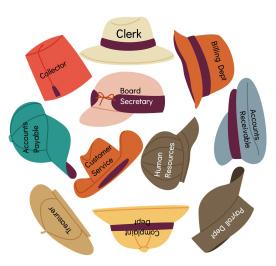
3 minute read
The Many Hats of a Small Town City Clerk
Ami Dieckman, MRWA Circuit Rider
All day, Every day! One interruption after another! Eventually they’ll get their work done, and hopefully with no errors! This is the life of the small-town city clerk. They’re working on an ordinance for the council meeting next week, while filling council packets, and trying to complete payroll, while a citizen is standing at the window to pay their water bill, and another citizen is on the phone complaining about the neighbor’s dog! They juggle interruption after interruption and endless small tasks daily. Of course, they get a slow day here and there amongst the chaos.
Advertisement
City clerks often do their jobs alone. Some cities have a collector or deputy clerk, but often this position is part-time. This makes it difficult for city clerks to work uninterrupted. These clerks must wear many hats each day. They are the utility clerk, the city clerk, the human resources manager, the payroll clerk, the treasurer, and this list keeps going. Occasionally a clerk may finish a task and not feel stressed or pressured, but the simplest task may be disrupted multiple times before completion. Not only does this sometimes feel as though the task took too long, but sometimes stepping away from a duty to work on another task may create room for error. This can be frustrating when the clerk realizes something was missed or overlooked. This can also create a stressor for clerks constantly having a fear of forgetting to do something important.
Clerks have many important duties and numerous important deadlines. Time management and organizational skills are key elements in the life of a city clerk. Keeping a calendar and keeping it well detailed can be one of the best bits of advice to ensure keeping on task. Sometimes the clerk just needs to know when it’s a good day to shut the door and focus on getting the project done. Often in small towns the clerk has a big hand in helping the operator get reports done as well. The clerk must learn to prioritize their day and be able to push things aside for a later time. Checklists help of course but they’re not fool proof!
This may very well be a root of high turnover in city clerk positions. It can be highly stressful for a clerk to make it through the first 3 years of being a city clerk. They spend the first year trying to figure out what they should do. The second year they’re still trying to figure these things out while hoping they didn’t royally mess things up during their first year. The third year comes around and they’re starting to figure out their ways and feel more confident in their duties. The support group around a new clerk needs to be strong.
It’s good to think about this dynamic if you work with a city clerk. Operators and boards should give patience and grace for a couple different reasons. Sure, any job can have varying amounts of stress. When your clerk has 6 tabs open in their brain, and the operator walks in and asks for another task to be you thought you should get. If an important deadline is missed and the clerk doesn’t typically make these errors, you should give grace and know the clerk already hopes it never happens again. Just remember your clerk didn’t just sit down and write your paycheck, they probably worked on 7-8 other things in the middle of it.
Pictured: Kerri Peters, Operator/Clerk for the City of New Hampton











